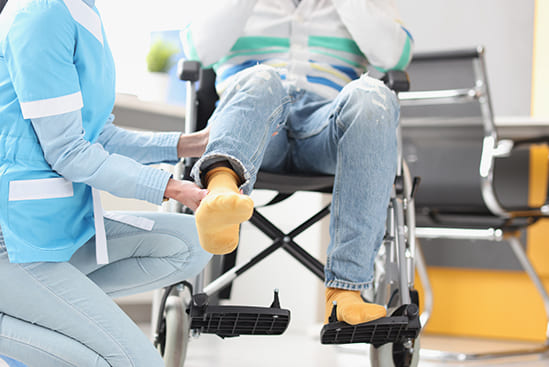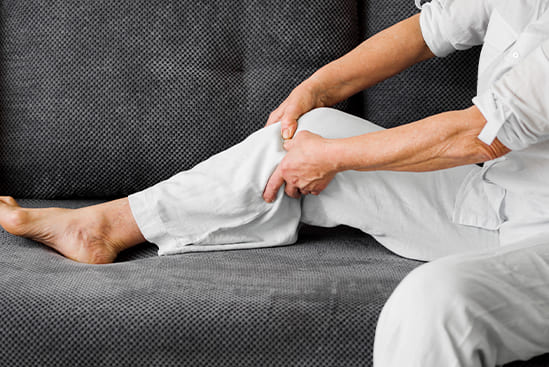

Introduction
Osteoarthritis is one of the most common joint conditions affecting adults today, particularly as we age. It is a degenerative condition characterised by the gradual breakdown of cartilage, which leads to pain, stiffness, and reduced mobility in weight-bearing joints like the knees, hips, and spine. For those seeking conservative, long-term solutions to these challenges, Synapse Physiotherapy provides a trusted environment where patients can access professional care close to home or work. Our approach to physiotherapy Cyberjaya focuses on creating intentional, evidence-based journeys that prioritise joint stability and movement efficiency, ensuring that rather than just managing symptoms, you are empowered to reclaim your independence and quality of life.
Understanding the Impact of Osteoarthritis
According to Harvard Health, osteoarthritis is the most common form of arthritis, and while it can damage any joint, the disorder most commonly affects joints in your hands, knees, hips, and spine. This type of joint pain occurs when the protective cartilage that cushions the ends of your bones wears down over time. This can lead to a variety of physical limitations that make daily tasks, such as climbing stairs or standing for long periods, increasingly difficult. Recognising the stages and key symptoms of osteoarthritis can enable early intervention, helping to prevent the condition from worsening.
Common Symptoms to Monitor
- Joint Pain: Often felt during or after physical activity.
- Stiffness: Particularly noticeable in the morning or after periods of rest.
- Reduced Range of Motion: Difficulty moving the joint through its full extent.
- Physical Sensations: Grinding or clicking sensations during movement, often accompanied by swelling.
Early intervention through physiotherapy Cyberjaya is vital because it helps slow disease progression and improves the muscle support required to protect affected joints.
Why Physiotherapy is Essential for Joint Health
Physiotherapy serves as a cornerstone of non-surgical care for osteoarthritis. Unlike temporary fixes, it addresses the underlying mechanics of how your body moves. By choosing a professional team to guide your rehabilitation, you can achieve several key benefits:
- Reduced Pain and Stiffness: Manual techniques and modalities help soothe inflamed tissues.
- Improved Muscle Strength: Strengthening the muscles around a joint provides better “shock absorption” for the cartilage.
- Enhanced Mobility and Balance: Training helps reduce the risk of falls and improves coordination.
- Delayed Surgical Intervention: Proactive care can often manage symptoms well enough to postpone or avoid the need for joint replacement.
Your Journey at Physiotherapy Cyberjaya
Every patient’s experience with OA is unique, which is why treatment at Synapse Physiotherapy begins with a comprehensive initial assessment.
The Initial Assessment Process
During your first visit for physiotherapy Cyberjaya, your therapist will perform a detailed evaluation:
- Reviewing your medical and activity history to understand your lifestyle.
- Assessing joint range of motion and muscle strength.
- Observing your gait (walking pattern) and functional movements.
- Identifying any postural or movement compensations you may have developed to avoid pain.
This assessment is the foundation for a targeted treatment plan designed to address your specific symptoms and functional goals.
Evidence-Based Treatment Strategies
1. Pain Management and Relief
Pain is frequently the primary reason individuals seek physiotherapy Cyberjaya. To help patients move more comfortably, therapists utilise various techniques, including gentle joint mobilisation, soft tissue massage to reduce tension, and heat or cold therapy for immediate symptom relief.
2. Customised Therapeutic Exercise
Exercise is arguably the most critical component of osteoarthritis care. A professional team will design a progressive programme that might include:
- Knee OA: Quadriceps and hip strengthening to stabilise the knee joint.
- Hip and Spine OA: Gluteal and core exercises to improve support and alignment.
- Flexibility: Specific range-of-motion exercises to combat chronic stiffness.
3. Functional and Balance Training
Because OA can affect your coordination, physiotherapy Cyberjaya clinics incorporate balance exercises and gait training. These interventions ensure that you can navigate your daily environment safely and with renewed confidence.
Education and Long-Term Self-Management
A significant portion of effective care involves empowering the patient. Through education, you will learn about activity modification to reduce joint stress, the importance of weight management, and the proper use of supportive devices if necessary. At Synapse Physiotherapy, we believe that informed patients make the best lifestyle choices for their long-term health.
Preventing Flare-Ups
Consistency is the secret to managing a chronic condition like osteoarthritis. To prevent painful flare-ups, patients are encouraged to:
- Adhere to their prescribed home exercise programmes.
- Avoid prolonged static positions that lead to stiffness.
- Use proper ergonomic techniques during daily activities.
Selecting the Right Clinic in Cyberjaya
When looking for physiotherapy Cyberjaya, it is important to select a provider that focuses on long-term management rather than just short-term relief. Consider a clinic that offers individualised treatment plans, clear communication, and a supportive, patient-centred environment. Whether you are in the early stages of the condition or managing moderate to advanced symptoms, professional intervention can significantly improve your comfort and quality of life.
Frequently Asked Questions
1. How often should I attend physiotherapy sessions?
The frequency depends on your symptom severity and goals. Many patients start with weekly sessions and reduce the frequency as they become more independent with their home exercises.
2. Can physiotherapy help if I have advanced osteoarthritis?
Yes. Even in advanced stages, physiotherapy Cyberjaya focuses on pain reduction, functional adaptation training, and improving your tolerance for daily activities to enhance your quality of life.
3. Is exercise safe if my joints are already painful?
Physiotherapists design safe, controlled, and pain-free movement programmes. Exercise actually improves joint support and reduces the stress placed on damaged cartilage.
4. What is the goal of the initial physiotherapy assessment?
The assessment allows the therapist to identify the specific contributing factors to your pain and design a plan that addresses your unique postural or movement compensations.
5. How does physiotherapy delay the need for surgery?
By improving muscle strength and joint stability, physiotherapy reduces the mechanical load on the joint, which can slow degeneration and maintain function for longer periods.
Conclusion
Osteoarthritis may be a chronic condition, but it does not have to dictate your lifestyle or limit your independence. Through the expert application of physiotherapy Cyberjaya, individuals can access evidence-based care that effectively reduces pain and restores mobility. By partnering with a professional team at Synapse Physiotherapy, you receive a personalised roadmap involving hands-on treatment, tailored exercises, and vital education on osteoarthritis care. Taking this proactive step towards joint health can help you manage your condition confidently and maintain the active life you enjoy. If you are ready to improve your movement and reduce joint stiffness, book a consultation today to begin your journey for a better health.
Tags :

Back & Neck Pain
- Spine & Core Rehabilitation
- Strength & Conditioning Programme
- Pain Management
- Biomechanical Assessment
- Sports Physiotherapy
- Group Class

Sports Injuries
- Strength & Conditioning Programme
- Pain Management
- Biomechanical Assessment
- Sports Physiotherapy
- Shockwave Therapy
- Group Class

Work Desk Injuries

Pre-Post-Surgical Conditions

Scoliosis & Postural Abnormalities

Neurological Conditions

Osteoarthritis & Rheumatism
Joint degeneration and inflammation happens as the human body grows older, but that does not mean our way of life degenerates as well. Relief your joint pains with a joint effort together with your physiotherapist, who will provide pain-relief treatments and prescribe exercises for your wellbeing.

Conditions Relating To Elderly
Common conditions in the older age population include hips & knee pain, back & neck pain, osteoarthritis, rheumatism, fear of falling and many more. Aging and degeneration of bodily function is inevitable, but here at Synapse, we will help you live the best of your life.










